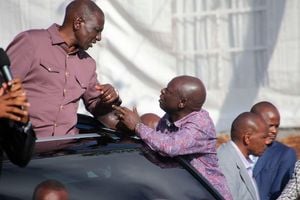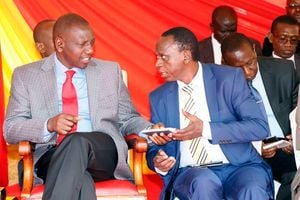Gerry was a major cog in the success of ‘The East African’

Gerry Loughran.
I met Gerry Loughran—the Sunday Nation columnist who will be buried tomorrow—when I was incorporated into the core team that was set up to put together The East African newspaper in 1994.
Members were drawn from different departments of the Nation Media Group to work under the leadership of Executive Chairman Albert Ekirapa and Managing Editor Joseph Odindo. Regular meetings were held in the 5th floor boardroom at Nation Centre.
The team worked like a commando squad, with warnings that what had been discussed should not be shared with “outsiders”.
Besides Mr Ekirapa and Mr Odindo, other members were Managing Director Wilfred Kiboro, Wangethi Mwangi, Ken Oluoch, Peter Kuria, Charles Kimathi, Emily Nwankwo, Dennis Aluanga, Cyrille Nabutola and Jerry Okungu.
We were later joined by colleagues Richard Shaba, Henry Muhanika and Edmund Nyoni from Tanzania, and Conrad Nkutu, Edmond Kizito and Carol Aneno from Uganda.
Gerry was like the unofficial project consultant on matters editorial and any other issue that required his vast media experience. We learnt a lot from his contributions, especially on how a regional newspaper should hold its own at the newsstand.
I recall that he always emphasised that The East African would be more analytical to give value for money. He also underlined the fact that a core group of readers was expected to be diplomats and staff of international non-governmental organisations serving in the region.
Being a weekly, it was not packaged to break news with screaming headlines like the Daily Nation would do. It was meant to give more flesh on what the dailies had reported and blend with a regional opinion around the same topical issues.
As days went by, word filtered in that a competing media house was also coming up with a regional newspaper. The message was so strong that some discussions were now restricted to the nuclear team comprising about four or five individuals.
About a month before our launch, Kenyans woke up to a freshly minted regional newspaper called The East African Chronicles published by a nondescript media house.
Apparently, the rivals had been made to believe that what the Nation Media Group was cooking was to be called The East African Chronicle. They rushed to the registrar and reserved the name, complete with its masthead. More like what Kenyan political parties often do to pull the rug from under a rival’s feet.
The big difference came in the way they segmented their newspaper pages by allocating each country its own news page.
If a new regional publication was to demonstrate a sense of unity for the regional players, then it was prudent to integrate news and stories from all countries in all pages. That is what the NMG team had conceptualised as a game changer in the layout of The East African.
Readers had to be drawn into having a sense of belonging when reading integrated stories as if they were from one single entity. The paper was positioned to be an experience.
Since we used to sometimes leave the office late, Gerry would ask some of us to accompany him to the exclusive Luke’s Club next door. Run by his old buddy Ron Andrews, the place was a meeting point for late diners and top corporate executives passing by to unwind after a tough day in the office. Nairobi city centre was fairly safe those days.
After the newspaper was launched in November 1994, Gerry became a common feature at Nation Centre, leaning on the front pillars puffing away during a break. It is at Luke’s Club that Gerry would regale us with his exploits in the different cities he had worked in.
His favourite tales were weaved around his days working in Beirut as a correspondent during the Lebanese-Israeli conflicts. The days in Moscow were also hilarious when Gerry explained how the Russian city was out of this world during communism.
I remember Gerry always carrying something to read whenever he walked out to go for lunch. That made me wonder how well he enjoyed his meal while reading or filling all the cryptic crosswords.
The East African was launched in 1994, two years after the English Premier League was repackaged as a professional outfit and sponsored by Barclays Bank. Watching the EPL on weekends was the norm for many football lovers in Kenya.
Back in England, Allan Shearer was a typical EPL celebrity and Gerry was a born Newcastle United Football Club fan. As a football fan in Kenya learning to fall in love with Arsenal FC, I often wondered why Gerry supported Newcastle United. He once told me that in the UK, people stuck with their home teams no matter what—that’s why even small stadiums are always filled to capacity. Newcastle was his hometown and Newcastle FC the club supported by the Loughran family for generations.
Fare thee well Geordie, Gerry Loughran.
- The writer, who worked for the National Media Group, is an author and researcher




